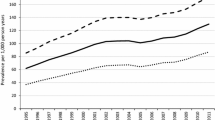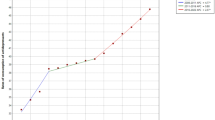Abstract
Background/aims
The aim of this study was to identify the trends in antidepressant (AD) medication use in two Irish general practices over a 5-year period, 2016 to 2020. The rationale for this study is attributed to the growing prevalence of depression amongst the Irish general public as well as concerns surrounding long-term AD medication use.
Methods
The research was undertaken in 2021 examining AD prescription rates from 2016 to 2020. The medications of interest were selective serotonin and norepinephrine reuptake inhibitors (SSRI and SNRIs): sertraline, escitalopram, fluoxetine and venlafaxine. The number of medical card holders (MCH) and prescription dispensing rates were analysed for observable trends.
Results
AD medication use is rising amongst the Irish MCH population. The number of MCH prescribed AD grew from 9.42 to 12.3 per 100 MCH between the years 2016 and 2020, respectively. The year 2020 represented the largest proportion of MCH prescriptions, 6.32 AD prescriptions per 1000 MCH prescriptions. The years 2019 to 2020 represented the largest annual increase in prescription dispensing with a growth of 0.45 per 1000 MCH prescriptions. Annual figures show a continual increase in AD dispensing refill rates from 4.14 to 5.67 per 1000 MCH prescriptions in 2016 and 2020, respectively.
Conclusion
This study illustrates a steady rise in AD medication within the general practice setting, with an observed rise in prescription dispensing rates. The high proportion of refill prescriptions demonstrates the long-term use of AD medications. This may be indicative of chronic depression or may highlight a lack of appropriate medication cessation strategies.



Similar content being viewed by others
Data availability
Data is available by reasonable request from the authors.
References
Who.int (2021) Depression [Online]. Available at https://www.who.int/health-topics/depression#tab=tab_1. Accessed 3 Aug 2021
Mental Health Ireland (2018) Mental health and wellbeing [Online]. Mental Health Ireland. Available at https://www.mentalhealthireland.ie/research/. Accessed 7 Aug 2021
Schmitter M, Spijker J, Smit F et al (2020) Exercise enhances: Study protocol of a randomized controlled trial on aerobic exercise as depression treatment augmentation. BMC Psychiatry 20(1)
Who.int (2020) Depression [Online]. Available at https://www.who.int/en/news-room/fact-sheets/detail/depression. Accessed 13 Aug 2021
NHS Digital (2021) Antidepressants were the area with largest increase in prescription items in 2016 - NHS Digital [Online]. Available at https://digital.nhs.uk/news-and-events/news-archive/2017-news-archive/antidepressants-were-the-area-with-largest-increase-in-prescription-items-in-2016. Accessed 3 Sept 2021
BMJ (2009) Explaining the rise in antidepressant prescribing: A descriptive study using the general practice research database. 339(Oct23 1):b4361-b4361 [Online]. Available at https://www.bmj.com/content/339/bmj.b3999. Accessed 3 Aug 2021
Chang J, Zamparelli A, Nettis M, Pariante C (2021) Antidepressant drugs: Mechanisms of action and side effects [Online]. ResearchGate. Available at https://www.researchgate.net/profile/Maria-Nettis2/publication/350444516_Antidepressant_Drugs_Mechanisms_of_Action_and_Side_Effects/links/606451bda6fdccbfea1aaf53/Antidepressant-Drugs-Mechanisms-of-Action-and-Side-Effects.pdf?origin=publication_detail. Accessed 7 Aug 2021
Iacobucci G (2019) NICE updates antidepressant guidelines to reflect severity and length of withdrawal symptoms. BMJ 367:l6103 [Online]. Available at https://www.bmj.com/content/367/bmj.l6103.full. Accessed 28 Jul 2021
Davies J, Read J (2019) A systematic review into the incidence, severity and duration of antidepressant withdrawal effects: Are guidelines evidence-based? Addict Behav 97:111–121
Bosman R, Huijbregts K, Verhaak P et al (2016). Long-term antidepressant use: A qualitative study on perspectives of patients and GPs in primary care. Br J Gen Pract 66(651):e708-e719 [Online]. Available at https://bjgp.org/content/66/651/e708. Accessed 2 Aug 2021
Bowers H, Kendrick T, van Ginneken N et al (2021) A digital intervention for primary care practitioners to support antidepressant discontinuation (advisor for health professionals): development study. J Med Intern Res 23(7):e25537 [Online]. Available at https://www.jmir.org/2021/7/e25537. Accessed 5 Aug 2021
Health Service Executive (2017) Primary care reimbursement service statistical analysis of claims and payments. Dublin: HSE
Health Service Executive (2020) Primary care reimbursement service statistical analysis of claims and payments. Dublin: HSE
Conlan K, McGrath J, Teeling M (2021) Antipsychotic prescribing in GMS paediatric and young adult population in Ireland 2005–2015: Repeated cross-sectional study. Ir J Psychol Med 1–10 [Online].https://pubmed.ncbi.nlm.nih.gov/33745473/ Accessed 12 Aug 2021
Kantor E, Rehm C, Haas J, Chan A, Giovannucci E (2015) Trends in Prescription Drug Use Among Adults in the United States From 1999-2012. JAMA, [online] 314(17), p.1818. Available at: https://www.ncbi.nlm.nih.gov/pmc/articles/PMC4752169/
Davey C, Chanen A (2016) The unfulfilled promise of the antidepressant medications. Med J Aust 204(9):348–350 [Online]. Available at https://onlinelibrary.wiley.com/doi/abs/10.5694/mja16.00194. Accessed 5 Aug 2021
O’Neill A, McFarland J, Kelly D (2021) Long-term antidepressant use in a cohort of older people. Int J Geriatr Psychiatry 36(8):1241–1251
Kelly D, Graffi J, Noonan M et al (2021) Exploration of GP perspectives on deprescribing antidepressants: A qualitative study. BMJ Open 11(4):e046054
Read J, Renton J, Harrop C et al (2020) A survey of UK general practitioners about depression, antidepressants and withdrawal: Implementing the 2019 Public Health England report. Ther Adv Psychopharmacol 10:204512532095012
Bowers H, Williams S, Geraghty A et al (2019) Helping people discontinue long-term antidepressants: Views of health professionals in UK primary care. BMJ Open 9(7):e027837
Read J, Gee A, Diggle J, Butler H (2019) Staying on, and coming off, antidepressants: the experiences of 752 UK adults. Addict Behav 88:82–85
Kelly B (2020) Impact of COVID-19 on mental health in Ireland: Evidence to date. Ir Med J 113(10):214
McLoughlin J, O’Grady M, Hallahan B (2021) Impact of the COVID-19 pandemic on patients with pre-existing mood disorders. Ir J Psychol Med 1–10
Hyland P, Shevlin M, Murphy J et al (2021) A longitudinal assessment of depression and anxiety in the Republic of Ireland before and during the COVID-19 pandemic. Psychiatry Res 300:113905
Homeniuk R, Collins C (2021) How COVID-19 has affected general practice consultations and income: General practitioner cross-sectional population survey evidence from Ireland. BMJ Open 11(4):e044685
Nshimyiryo A, Barnhart D, Cubaka V et al (2021) Barriers and coping mechanisms to accessing healthcare during the COVID-19 lockdown: A cross-sectional survey among patients with chronic diseases in rural Rwanda. BMC Pub Health 21(1)
Teng A, Taylor Z, Pfeffer J, Williams, L, (2020) Using longitudinal prescription data to examine the incidence of other chronic diseases following antidepressant use. Journal of Psychiatric Research, [online] 125, pp.7-12. Available at: https://pubmed.ncbi.nlm.nih.gov/32171110/
Petersen A (2019) New concerns emerge about long-term antidepressant use [Ebook]. Anxiety & Depression Association of America, pp 1–6. Available at https://adaa.org/sites/default/files/New%20Concerns%20Emerge%20About%20Long-Term%20Antidepressant%20Use.pdf. Accessed 9 Aug 2021
Kendrick T (2020) Strategies to reduce use of antidepressants. Br J Clin Pharmacol 87(1):23–33
Donald M, Partanen R, Sharman L et al (2021) Long-term antidepressant use in general practice: A qualitative study of GPs’ views on discontinuation. Br J Gen Pract 71(708):e508–e516
Walsh, M. and Duffy, I (2018) A Descriptive Study of Antidepressant Prescribing In a Semi-Rural Practice. Irish Medical Journal, 111(5), p.75
Bäuerle A, Graf J, Jansen C et al (2020) An e-mental health intervention to support burdened people in times of the COVID-19 pandemic: CoPE It. J Public Health 42(3):647–648
Acknowledgements
We would like to thank our research supervisor, Dervla Kelly, and Prof. Deirdre McGrath, head of School of Medicine, University of Limerick. In addition, we would like to extend our thanks to Dr. Sean Montague, Dr. Andrew Lavin, and Dr. Jerry O’Flynn for supporting the research.
Author information
Authors and Affiliations
Contributions
The idea for this study was proposed by AM. All authors contributed to the development of the concept and design. Data collection: KL and AM. The introduction was written by KL and AM. Methodology: AM, KL and DK. Results: KL and AM. Discussion: AM and KL. Limitations: AM. Tables and figures were created and edited by KL and AM. Original draft preparation: AM and KL. Writing—review and editing: PH, DK, AM and KL. Supervision: DK. All authors commented on the previous versions of the manuscript. All authors read, commented, and approved the final manuscript.
Corresponding author
Ethics declarations
Ethics approval
Education and Health Sciences Research Ethics Committee, University of Limerick, 2021_04_10_EHS.
Conflict of interest
The authors declare no competing interest.
Additional information
Publisher's Note
Springer Nature remains neutral with regard to jurisdictional claims in published maps and institutional affiliations.
Rights and permissions
About this article
Cite this article
McCool, A., Lukas, K., Hayes, P. et al. Antidepressant medication prescribing patterns in Irish general practice from 2016 to 2020 to assess for long-term use. Ir J Med Sci 191, 2239–2246 (2022). https://doi.org/10.1007/s11845-021-02833-7
Received:
Accepted:
Published:
Issue Date:
DOI: https://doi.org/10.1007/s11845-021-02833-7




